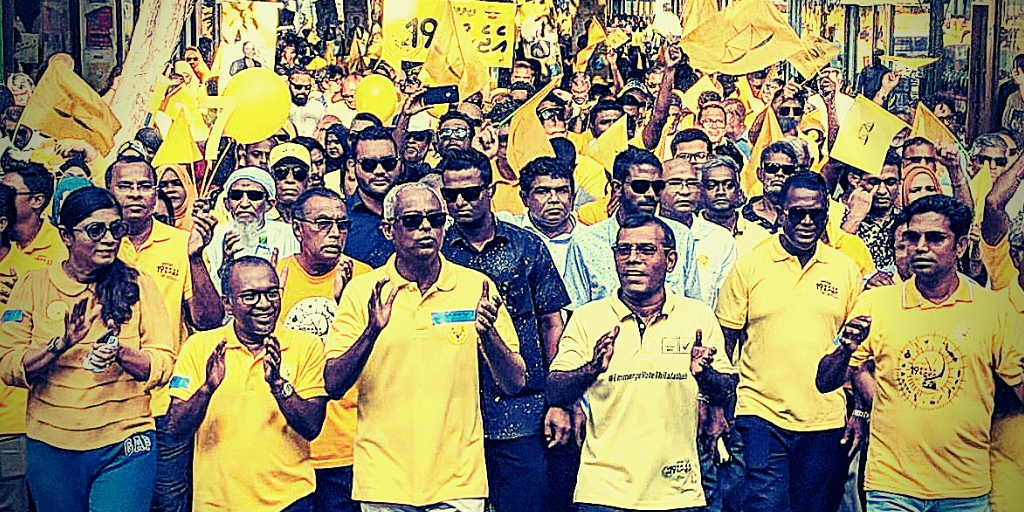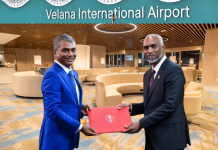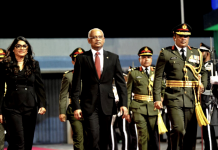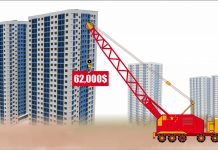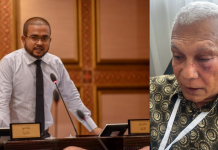Ex-president Mohamed Nasheed, was set for a dramatic return to the top of the national parliament, with his Maldivian Democratic Party headed for a two-thirds majority in the 87-member assembly.
Saturday’s poll was the first test of public opinion since autocratic former president and Nasheed’s arch-rival Abdulla Yameen was forced to stand down after his five-year term, facing charges of money laundering and embezzlement.
Nasheed returned to the country after President Ibrahim Mohamed Solih won an unexpected victory in September presidential elections for the MDP. Yameen had barred Nasheed from contesting.
Preliminary results from Saturday’s election showed the MDP winning 50 out of the 87 seats, while media reports projected the party eventually getting up to 68 seats.
Congratulations President @ibusolih on a significant election victory that will help you deliver on your election pledges. MRM will always stand with the people and support those who work for the good of the nation.
— Maumoon Abdul Gayoom (@maumoonagayoom) April 7, 2019
It’s a phenomenal night. An outstanding victory for democracy in #Maldives! Congratulations to all MDP MPs elect! This marks the beginning of implementing #agenda19. The people have spoken and this clear majority for MDP is in itself a strong show of faith in President @ibusolih pic.twitter.com/s8k0vOojIr
— Abdulla Shahid 🎈 (@abdulla_shahid) April 6, 2019
It’s been a long journey for justice but until “justice rolls down like waters and righteousness like a mighty stream”, justice will not be seen to be done. Let’s work together and make judicial reform a reality. Congratulations to all candidates who have pledged to #Agenda19
— I.Riffath (@ibriffath) April 6, 2019
Warm congratulations to President @ibusolih and @MohamedNasheed in securing the overwhelming majority at the 2019 Maldives’ parliamentary election today. The people of the #Maldives have endorsed #Agenda19. It’s time to start fulfilling their expectations.
— Professor Ugail (@ugail) April 6, 2019
To mark this historic moment, I asked HEP @ibusolih to kindly let me have the selfie on my phone, which HEP @ibusolih is so famous for. After all t’was the “Hikmaiytheri Siyasy Duet🎷” of these 2leaders; HEP @ibusolih & Prez @MohamedNasheed that got us this glorious win! Salute🙏 pic.twitter.com/6PRw5xM4l0
— Mariya Didi 🎈 (@MariyaDidi) April 7, 2019
Election officials estimated the final turnout to be between 70 and 80 per cent, down from the 89 percent recorded at the September presidential election which unexpectedly toppled Yameen.
Nasheed, now set to take over the leadership of the legislature, has promised to turn the country into a parliamentary democracy by scrapping the executive presidential system adopted under political reforms in 2008.
President Solih said in a statement that the MDP had “secured a huge majority in Majlis .“While we celebrate, we must also not forget the immense challenges that lie ahead of us.
Celebrating the victory – MDP’s remarkable comeback after 7 Years,makes history with landslide victory in the 2019 parliamentary elections. #Maldives #Majlis19 pic.twitter.com/6k6J6nzCDm
— Maldives Voice (@MaldivesVoice4) April 7, 2019
Solih campaigned for the MDP asking voters to return a parliament that could work with him to deliver on his election promises in September to investigate corruption under Yameen.
While Yameen was not a candidate, his Progressive Party of Maldives was seen as the main challenger to the MDP – but ended up with a poor showing, and is projected to get only four seats.
It’s a remarkable comeback for the former president who was forced into exile till late last year following a controversial terrorism conviction. A clear majority will help his Maldivian Democratic Party to consolidate its hold on power and carry out political and economic reforms. The party says it wants to reduce political influence over the judiciary and police and end corruption and also wants to reduce the country’s dependence on China .

